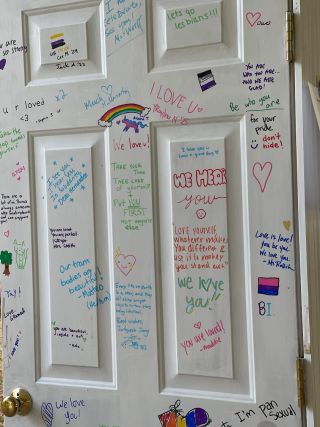Adolescence
How Schools Can Support LGBTQ Youth
Coming out is easier in a compassionate climate.
Updated October 11, 2023 Reviewed by Lybi Ma
Key points
- In many states, new laws restrict schools from implementing inclusive policies that support LGBTQ+ youth.
- These laws create a hostile climate that can be devastating to students and deter them from coming out.
- Schools can foster a compassionate climate that encourages all students to be true to their authentic selves.
Although the LGBTQ community has made huge strides in gaining social acceptance and civil rights over the past 50 years, the current climate has turned unexpectedly hostile. From hate crimes targeting individuals who align with queer culture to record numbers of anti-LGBTQ bills introduced in state legislatures across the country, LGBTQ people are feeling increasingly under attack. In this hostile climate, coming out can feel more risky, even dangerous.
A Thought Experiment
To understand why an LGBTQ individual can feel so endangered by a hostile climate, pick a physical characteristic you inherited or were born with—perhaps straight hair, large feet, a birthmark, or a gap between your two front teeth. Or think about your unique and preferred self-expression—perhaps being passionate about denim, mathematics, your religion, or moving your body on the dance floor or the soccer field.
Now imagine that a new leader has just announced that your inborn quality or self-expression indicates that you are bad or unnatural. Imagine that it becomes more acceptable—even trendy—for people to tease, bully, or shun those who look or behave like you. Sure, your inner circle of family and friends still accepts you. And only one aspect of your whole self is under attack. But this groundswell of rejection stings. Your confidence begins to waver and you feel worried about being judged or treated unkindly.
Increasingly anxious, you might start protecting yourself from public scorn, perhaps curling your hair, squeezing your feet into smaller shoes, putting makeup on your birthmark, or smiling with your mouth closed. You might feel safer leaving the denim at home or observing your faith in secrecy. You keep mathematics to yourself, give up dancing, or quit playing soccer. Do you feel depleted and discouraged?
Imagine that new laws require schools in your area to remove library books, curriculum, and other materials that acknowledge and feature people like you or interests like yours. Whether your school was an oasis or not, now it's seemingly against the law for it to be a safe place. Imagine being required to deny certain fundamental aspects of yourself. Imagine being expected to conform to something you’re not. Imagine noticing that this part of yourself has become invisible—unseen, unheard, and unappreciated. Imagine secrets being far safer than coming out.
When you are judged as inferior, wrong, or unworthy, how do you fight against that, especially when you're young? Imagine wondering if suicide was your best option.
When laws require schools and educators to neglect and disrespect the needs of LGBTQ students, the resulting messages are powerful. Neglect sends the message, “You don’t exist.” Disrespect sends the message, “You are not valued.” It can be devastating for all students and demoralizing for educators to live in a society that mandates schools to mistreat certain students. Not surprisingly, among LGBTQ youth, depression, anxiety, poor self-worth, and suicide rates are on the rise. And many educators are at risk for moral injury on the job.
Origins of the LGBTQ-Hostile Climate
How can we make sense of this LGBTQ-hostile climate and why is it going viral? Research on the impulse to enforce gender norms would suggest that powerful individuals (such as politicians, influencers, and media personalities) can create a hostile climate by spreading anti-LGTBQ rhetoric and introducing legislation to satisfy their own impulses to enforce gender and sexuality norms. Other individuals can see and hear these messages and are emboldened to act on their own impulses to enforce these norms, which reinforces this hostile climate and spreads it far and wide.
Legal enforcement of gender and sexuality norms gives young people a clear message that they'd best conform to the idea that "boys will be boys, and boys want to kiss girls." LGTBQ youth who are struggling to conform will naturally think that if they can just pretend to “fit in,” they won’t be bullied or shunned. Unfortunately, pretending makes them feel dishonest, invisible, and unsupported while submitting to social pressures decreases self-respect. Some kids may try to conform in an attempt to feel better about themselves. Unfortunately, conforming means they are internalizing society’s hostile message and forging a false self, which makes them feel worse about their true selves. Self-hatred has a profound effect on physical, mental, and emotional well-being. The antidote is self-compassion, which is cultivated in a compassionate climate.
Creating a Compassionate Climate
Compassionate support is more important than ever for LGTBQ youth. Honoring LGTBQ National Coming Out Day is one way to affirm this community. This day doesn’t require or even necessarily encourage imperiled youth to come out, but by seeing others acknowledge and celebrate the process, they are encouraged to ponder the possibilities for themselves. Celebrating those who've come out gives youth a hopeful vision of a future in which they can be and express every part of their authentic selves.
Research shows that being honest and true to oneself improves all aspects of well-being, including relationships with others. While many teens especially fear coming out to parents (and yes, some will be rejected), many are pleasantly surprised, and others are relieved to discover that acceptance improves over time. Naturally, coming out is far easier in a compassionate climate.

How can schools forge a compassionate climate? Phillips Exeter Academy, a private school in New Hampshire, has implemented a tradition that serves all students. A white, open door in a stand-alone door frame is placed outdoors, in a central part of the campus. Colored, indelible markers are included for students to write compassionate, encouraging words to their classmates. Messages include,
“I see you, I hear you, in solidarity.”
“You are beautiful, inside and out.”
“You are who you are, and we are glad.”
“Be who you are. For your pride, don’t hide.”
“Love yourself, whatever makes you different, and use it to make you stand out.”
Note that these messages can speak to every student and encourage the practice of self-compassion. Even if your school is located in a fiercely anti-LGTBQ state, there are no laws against having students and faculty write encouraging messages that promote self-compassion and can apply to everyone.
Indeed, the vast majority of kids are at times self-conscious, self-critical, or embarrassed, or have been teased about some aspect of themselves—parts of their being, their self-expression, or their appearance. Being encouraged to show compassion to each other and to receive those supportive messages can create a compassionate, accepting school climate, which can boost emotional, physical, and social well-being for everyone. Students and teachers alike.
References
LGBTQ media expert Robert Conner suggests that schools “celebrate LGBTQ History Month and National Coming Out Day through campus events, assemblies, and disseminating resources such as biographies of LGBTQ icons from LGBTHistoryMonth.com and GLSEN’s Back to School guide, which has a Coming Out Resource.
Franklin, K. Inside the Mind of People Who Hate Gays. Excerpted from: Unassuming Motivations: Contextualizing the Narratives of Antigay Assailants in Gregory M. Herek, Ed., Stigma and Sexual Orientation: Understanding Prejudice Against Lesbians, Gay Men, and Bisexuals (Thousand Oaks, CA: Sage Publications, 1998). Accessed October 10, 2023 at https://www.pbs.org/wgbh/pages/frontline/shows/assault/roots/franklin.html
Katz-Wise SL, Rosario M, Tsappis M. Lesbian, Gay, Bisexual, and Transgender Youth and Family Acceptance. Pediatr Clin North Am. 2016 Dec;63(6):1011-1025. doi: 10.1016/j.pcl.2016.07.005. PMID: 27865331; PMCID: PMC5127283.
Fox, J. Staying in the Closet: 5 Ways You Damage Your Physical and Emotional Health. Outsmart Magazine, March 11, 2016.Accessed October 10, 2023 at https://www.outsmartmagazine.com/2016/03/staying-in-the-closet-5-ways-you-damage-your-mental-physical-health/
Modern Path. Coming Out with Compassion. Accessed October 10, 2023 at https://www.modernpath.net/modern-path-speaks-out/coming-out-with-compassion
The Trevor Project 2023 U.S. National Survey on the Mental Health of LGTBQ Young People. Accessed October 3, 2023 at https://www.thetrevorproject.org/survey-2023/
Margolin, J. & Grant, T. Threats against the LGBTQIA+ community intensifying: Department of Homeland Security. ABC News, May 15, 2023. Accessed October 4, 2023 at https://abcnews.go.com/US/threats-lgbtqia-community-intensifying-department-homeland-security/story?id=99338137




